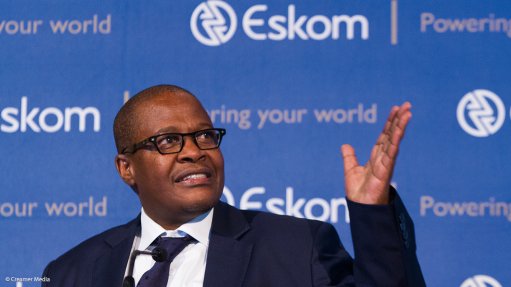
Photo by: Duane Daws
Government on Wednesday ordered that Brian Molefe’s return to the helm of Eskom be rescinded and conceded that it had inflicted reputational harm on the country and the power utility.
Public Enterprises Minister Lynne Brown told a media briefing she had met with the Eskom board and instructed it to remove Molefe from the post, following a decision by an inter-ministerial commission that considered the circumstances surrounding his controversial reappointment earlier this month.
Brown said she would appoint an acting CEO within 48 hours, and hinted that she could also remove the board next month over the debacle that drew criticism from the ruling African National Congress and sent the opposition to court to demand Molefe’s removal. She said she would, however, wait until after Eskom’s annual general meeting in three weeks’ time.
She would not act sooner so as not to cause “more scurrying in the markets”.
Finance Minister Malusi Gigaba concurred that “there obviously has to be some consequences for this situation that we have come out of”.
Brown said it was not clear to her at this stage whether Molefe would receive a termination pay-out, and she would discuss the issue with the board.
“I have an idea in my head but I can’t put my head on the table,” she said, adding that she had not spoken to Molefe, but left it to the board to inform him of government’s decision.
Molefe left Eskom under a cloud in November last year after he was implicated in former Public Protector Thuli Madonsela’s report on State capture.
He was reappointed to his old post two weeks ago, for the stated reason that he had mistakenly been granted early retirement which would entitle him to a pension pay-out of R30-million, a move that was vetoed by Brown.
The ministerial committee said on Wednesday it was of the view that the board could have corrected the administrative errors relating to Molefe’s contract in other ways than reinstating him.
“We are saying that the decision that was taken was unfortunate,” Gigaba said.
“The events of the last three weeks have been quite painful in a number of ways…. the board, if it sought to correct the anomalies in the issues that arose when the group CE resigned or retired, they could have done so administratively without having taken the decision that they took.
“It has caused government a lot of harm… it has caused Eskom itself a lot of reputational damage, it has caused board members a lot of reputational damage.”
Gigaba stressed that government’s decision should not be seen as a reflection on Molefe, who previously headed Transnet and served as an ANC MP for a few months this year.
“He is well capable. He has proven himself in a number of his previous responsibilities. We believe he still has an enormous contribution to make to the country, in whatever way it will be.”
He added: “There is no decision on our part of where he is going, there are no plans to appoint him anywhere else.”
Justice Minister Michael Masutha, who led the media briefing, said Eskom had been forced to make serious concessions in the papers it filed in opposing the Democratic Alliance’s court application to have Molefe removed, including that his contract wrongly allowed him to retire at the age of 50, his current age.
He said, however, the IMC’s decision should not be read as any reflection on what the outcome of the application may have been.
After the announcement that Molefe’s contract was terminated, the DA’s public enterprises spokeswoman, Natasha Mazzone, said it was imperative that a full-scale parliamentary probe be instituted into the state of affairs at Eskom.
Brown last week announced that she would be asking the Special Investigating Unit to investigate procurement problems at Eskom from 2007, to review all evidence gathered in the scope of seven separate investigations in recent years. This would include an investigation by PricewaterhouseCoopers that found that Eskom had failed to do due diligence when it hastily awarded a coal contract to the Gupta family’s Tegeta Exploration in 2015.
Molefe and Eskom chairman Ben Ngubane on Tuesday assured Parliament’s Standing Committee on Public Accounts that there had been nothing untoward about the deal as Eskom frequently concluded coal contracts without a competitive tender to prevent load-shedding.